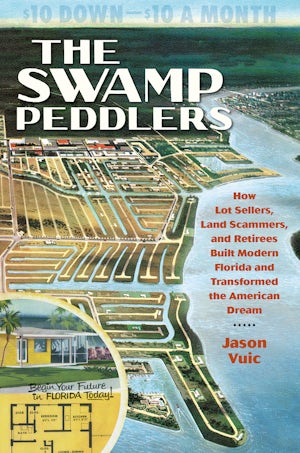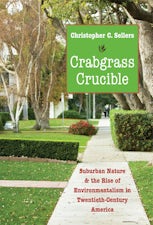The Swamp Peddlers
How Lot Sellers, Land Scammers, and Retirees Built Modern Florida and Transformed the American Dream
By Jason Vuic
268 pp., 6.125 x 9.25, 26 halftones, 4 maps, notes, index
-
Paperback ISBN: 978-1-4696-6333-3
Published: June 2021 -
Hardcover ISBN: 978-1-4696-6315-9
Published: June 2021 -
E-book EPUB ISBN: 978-1-4696-6316-6
Published: May 2021 -
E-book PDF ISBN: 979-8-8908-6146-7
Published: May 2021
Buy this Book
- Paperback $29.95
- Hardcover $95.00
- E-Book $19.99
For Professors:
Free E-Exam Copies
Awards & distinctions
Gold Medal, 2021 Florida Book Awards in Florida Nonfiction
2022 Charlton Tebeau Award, Florida Historical Society
In The Swamp Peddlers, Jason Vuic tells the raucous tale of the sale of residential lots in postwar Florida. Initially selling cheap homes to retirees with disposable income, by the mid-1950s developers realized that they could make more money selling parcels of land on installment to their customers. These "swamp peddlers" completely transformed the landscape and demographics of Florida, devastating the state environmentally by felling forests, draining wetlands, digging canals, and chopping up at least one million acres into grid-like subdivisions crisscrossed by thousands of miles of roads. Generations of northerners moved to Florida cheaply, but at a huge price: high-pressure sales tactics begat fraud; poor urban planning begat sprawl; poorly-regulated development begat environmental destruction, culminating in the perfect storm of the 21st-century subprime mortgage crisis.
About the Author
Jason Vuic is the author of The Yucks!: Two Years in Tampa with the Losingest Team in NFL History and The Yugo: The Rise and Fall of the Worst Car in History.
For more information about Jason Vuic, visit
the
Author
Page.
Reviews
"A detailed saga of Florida development, county by county, year by year. While some parts read like a satire of capitalistic greed, it is an honest examination of history that evolves into a cautionary tale of the human capacity for self-interest and acquisitiveness. The author’s research is unassailable. . . . [This] is an exceptional account of legal loopholes, egotistical hubris, environmental annihilation, and the mindless development of land at any cost."—Los Angeles Review of Books
"An excellent exploration of the shady ways people sold the Sunshine State in the twentieth century. With strong attention to detail, a good eye for the absurd, and finely-honed, carefully-aimed outrage, Vuic shows how grifting land developers subdivided the state and left investors, taxpayers, and Florida’s environment holding the bag."—Agricultural History
“Vuic presents a strong narrative and biographical foundation for understanding this history.”—Journal of Southern History
"A fascinating look at how old Florida went from acres of pine forests, wetlands and cattle ranches to today’s huge subdivisions sprawling across the state like a cancer, still devouring natural ecosystems."—Society of Environmental Journalists Book Shelf
“The Swamp Peddlers contributes to the quest to understand why Florida (and the Sun Belt) is the way it is—and reveals why that quest is far from over.”—Journal of the American Planning Association
"Vuic shows the transformation of old Florida, from acres of eco-sensitive wetlands, pine forests and cattle ranches, to today’s subdivisions sprawling across the state, devouring natural ecosystems."—The Gabber



